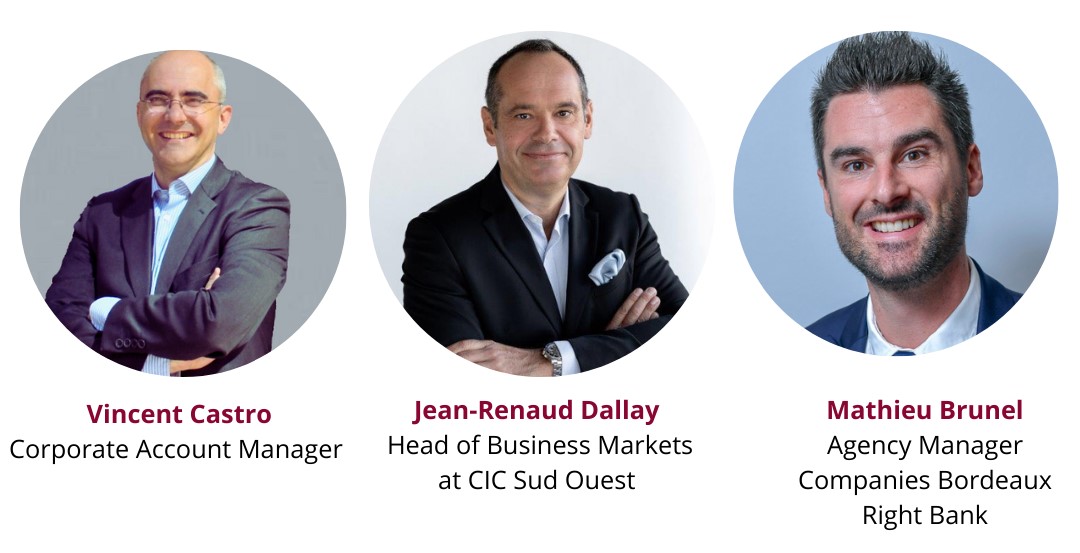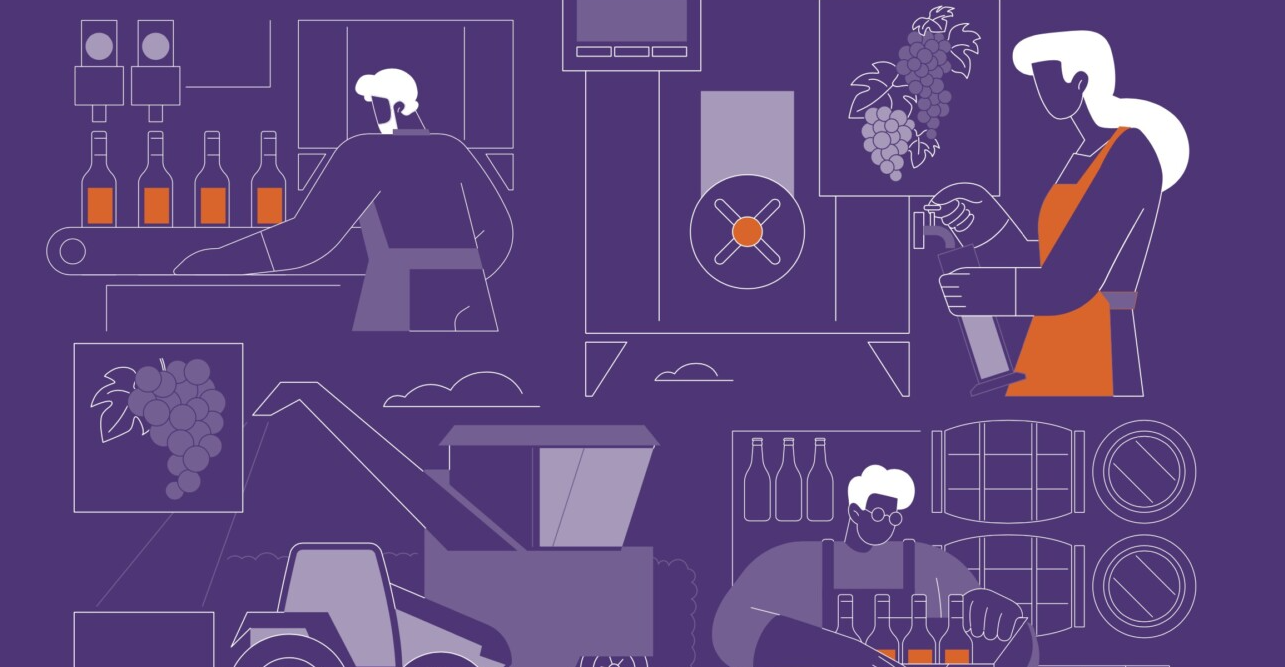“We are partners of La Place & we are committed to the long term”

This is the final part of our trilogy dedicated to the finances of the Bordeaux wine industry.
Jean-Renaud Dallay, Corporate Market Director at CIC Sud-Ouest, Mathieu Brunel, Corporate Branch Director and Vincent Castro, Corporate Account Manager at CIC Sud-Ouest, discuss the importance of collaboration between banks and companies in the industry to ensure their long-term financing.
Gerda: Could you give us an overview of the role of banks in supporting the Bordeaux wine industry?
Jean-Renaud Dallay: We are present throughout the entire value chain of the wine industry. Among our clients, we have suppliers, producers, courtiers, negociants, and wine shops. Our financing is quite concentrated towards the “grand estates” and negociant. We support our clients by financing their investment projects, which can include land acquisitions, plantings, investments in equipment, cellars. We are also very active in financing stockholding or primeur guarantees. We also intervene with dedicated teams on significant operations like property acquisitions and family business transfers.
Mathieu Brunel: We even go as far as supporting our clients internationally. This is one of the strengths of our group.
JRD: Yes, CIC Sud-Ouest is a bank that belongs to the Crédit Mutuel Alliance Fédérale Group, which is one of the largest banking groups in France and Europe. Their scope of intervention is quite broad and depends on the mission entrusted to them. For example, they can help identify new clients in a given market, find suppliers, provide reliable advice, and support new establishments both industrially and in HR. Our commitment to supporting our clients in their international activities is deeply embedded in our approach.
Economic Impact of Wine in Our Region
GB: How would you assess the economic impact of the wine industry on the Bordeaux region?
JRD : The economic impact of the wine industry on the Bordeaux region is very significant for our area and is multidimensional. Of course, there are the vineyard estates and negociant, which are major players in the regional economy, but also all the activities that revolve around them, such as suppliers, equipment, agricultural labor, and wine shop networks. The construction of cellars, some of which are spectacular, by certain large estates has also supported the activity of construction companies and specialized architectural firms.
MB: The turnover of the wine industry in the region ranges between 4 and 4.5 billion euros per year, generating lots of local jobs and injecting liquidity into the Bordeaux economy. Unlike other industries, such as aerospace, whose turnover can largely be realized elsewhere, the wine sector generates and maintains its value locally. This results in strong local profitability, similar to that of tourism, which not only supports the regional economy but also enhances and preserves the cultural heritage of Bordeaux.
GB: How do you rate the financial situation of La Place de Bordeaux?
JRD: It is difficult to generalize because our sector encompasses different categories. There are large estates that may be backed by wealthy families or major groups. Even though they need to carry the wines, they have the necessary resources, which does not pose major difficulties. For smaller estates, it is often more complicated, especially for those that sell mainly to large retailers. These owners are often squeezed by the rising production costs (raw materials, wages, etc.) and cannot pass these price increases on.
Between these two extremes, there are properties that sell less well and have to cope with the rising costs. The situation is not simple. We have a role to play in supporting them to help them get through this period.
As for the trading sector, some operators took advantage of the post-COVID period when the cost of money was close to zero to build strategic stocks that were intended to be carried for later value. This strategy is now challenged because the Euribor, the short-term reference index, is now close to 4% with some prospects of decrease, but it will never return to what we knew. Free money is over! This sharp increase in short-term interest rates has had a direct impact on the cost of carrying wines and thus on margins. The latest primeur campaign, where release prices were significantly lowered despite the high quality of the vintage, raises the question of the valuation of previous vintages’ stocks that were bought at too high prices. This deflationary trend should not continue, otherwise, it would call into question the primeur model—what is the point of carrying wine to sell it at the same price in two or three years?
There have been other crises. We support our clients in good times, but also in more difficult periods. We are partners of La Place and we are committed for the long term
Financing & Investment
G: What are the main challenges facing vineyard owners and the negociants?
JRD: We are sensing a lot of concern among our clients. The recent sharp rise in interest rates has had a significant impact. Properties and negociant, who carry substantial stocks over several years, are now seeing their carrying costs increase considerably. While the Euribor rate was previously at 0%, it is now close to 4%. This increase in carrying costs, which is very difficult to pass on to the final price in the current market conditions, directly impacts margins and destabilizes the market.
Climate change is another challenge that winegrowers face; it affects the product, with trends such as increasing alcohol content, and also impacts yields, which are affected by climatic hazards (drought, frost, hail, mildew…). CSR-related constraints also have consequences on production costs and investment needs.
There is also a certain “disaffection” for Bordeaux to the detriment of wines from other regions. How can we justify that even here, in Bordeaux, some restaurants do not have Bordeaux wines on their menu? This is unacceptable! We should be proud of our products. We need to find a solution to promote our terroir and succeed in attracting this younger generation that consumes wine differently. In Bordeaux, we are quite conservative by nature, which has its advantages, but for this generation, wine should be served cooler, fruitier, and simpler as an aperitif. We need to attract tomorrow’s consumer. All these phenomena, initiated for a long time, have a very significant impact today on the sector.
MB: We need to break away from the old codes. There is also a change in taste. The market demands wines that are less “oaky” and more vibrant, which requires a change in logistics, and the problem is that the wine world evolves slowly. Decisions made today will have an impact in 10 or 15 years, but tastes have already changed. There will be a transition in how the sector will evolve with these new trends.
We also need to say that our wines are not expensive. Sometimes, we have this French tendency to belittle ourselves. We should be proud of what we produce and learn to play more on the concept of brand. For me, it’s not just a matter of price. By focusing solely on prices and lowering them, we are going down the wrong path and strangling all market players, thus reducing margins and destabilizing the consumer.

Trends & Innovations
GB: Have you observed any trends or innovations in the wine industry’s requests for funding in recent years?
JRD: We are able to offer financing at subsidised rates when it is allocated to investments that have a positive impact on the carbon footprint. We continue to back our short- and medium-term financing with the value of stocks. The needs in this area have not changed very much, apart from the fact that in the current climate stocks are turning over less quickly, so the need for carry finance is increasing, whether at the level of the trade and/or the estates.
MB: Yes, while the types of requests have remained similar, the overall budget amounts have increased significantly. We continue to receive requests for portage, winery construction, vineyard planting, and the purchase of viticultural tools. The notable change is the substantial increase in the amount of finance requested. Additionally, a key innovation in recent years has been loans with subsidised rates for projects that positively impact CSR.
International Markets
GB: What role do banks play in helping traders and property owners navigate market fluctuations?
JRD: The concept of advisory doesn’t seem to align with reality. At CIC Sud-Ouest, we remain primarily generalist bankers. Our clients are the experts. They know the solutions better than we do. They understand the need to diversify, export, and enhance their product’s value through pricing, etc. Our job is to support these projects under good conditions for both the bank and the client, for example, by incorporating climate risks into forecasts (providing for half a harvest every 4 or 5 years) and supporting our clients in their projects.
Vincent Castro: We can provide lines of thought, anything that supports the client, such as diversification and risk distribution. We can also advise owners to consider offering their products to other traders, to open up to other countries if they are too concentrated in a few geographic areas.
JRD: The advisory part focuses solely on the aspects we know how to master. If a major investment project is being considered by one of our clients, we can intervene by bringing our expertise in structuring the operation. We can provide indications on what will be “financeable” by a bank and what will not be, or will be more difficult. In the case of property acquisitions, plots, transmission operations, or capital restructuring, we involve our specialists (estate engineers, structured finance advisors) who bring their expertise.

G : Many properties have been sold to Chinese investors. Are you seeing a different profile of buyers these days?
JRD: We have observed a sustained interest from institutional investors in Bordeaux for many years.
These investments by large groups in Bordeaux properties have contributed to significant land price inflation. During this period, many properties changed hands, with some being bought from families who had owned them for several generations. In France, the transmission values of these properties are based on the land value.
However, there is often a significant gap between the asset value and the income it generates, making it complex and sometimes impossible for siblings to buy out each other’s shares. If we want these properties to remain in families, it is essential to anticipate and use all the legal and fiscal levers that allow for transmission while benefiting from allowances and exemptions. Banks, as well as advisors, lawyers, and notaries, have a crucial role to play in these operations.
G: Without going into details and without making any commitments, how do you assess the financial situation of RCA?
VC: It is a major player in the market that has achieved remarkable success over the past 15 years. It has been a long-standing partner of CIC.
JRD: Indeed, we are proud to have supported Roland Coiffe since its beginnings. It is a trading company with an exceptional track record. There are very few equivalents. For us, it represents a benchmark.
Gerda BEZIADE has an incredible passion for wine, and possesses a perfect knowledge of Bordeaux acquired within prestigious wine merchants for 25 years.
Gerda joins Roland Coiffe & Associés in order to bring you, through “Inside La PLACE” more information about the estate we sell.

